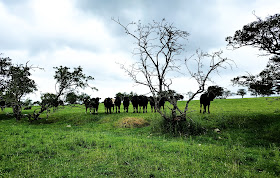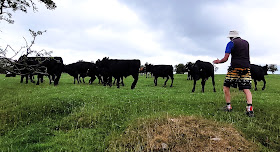In my last post, I described how Paula and I failed to find the continuation of the public footpath to Catterlen after we’d crossed the River Petteril, and as a result we followed an alternative path that led to a few problems with cows as we crossed their field. Well, a few days later we were back to make another attempt to follow the missed path, and this time we succeeded, albeit not without more problems with cows.
I took a few photos of the first section of the ‘path’, which to start with can be more accurately described as a ‘track’:
Although the track starts off by running parallel to the motorway, this first photo shows the point where it starts to diverge away.
More photos:
After we passed the open gate that I described in my previous post, the way becomes considerably overgrown:
…but we eventually reach a gate on the left, from where the path crosses an open field towards the first footbridge over the River Petteril:
The way ahead, up the hill on the far side of the river, isn’t at all obvious. Before tackling the hill, I took this photo of masonry ruins:
I can only guess its original purpose, although I suspect that it had something to do with drainage in the area.
From a point further up the hill, I took this photo looking back down towards the river:
You can see the second footbridge, which we crossed during our earlier venture into this area, to the right of centre.
And then things started to get really interesting!
Thou shalt not pass! That was my impression, but I was having none of it:
I cleared a comfortable path across the field, but when we reached the gate into the next field, which was empty, we could see another herd massing behind the next gate. They were waiting for us when we reached the gate:
However, this was definitely the way to go, and I was able to induce these cantankerous cattle to get out of our way quite easily:
We reached Catterlen without further problems. Although the original signpost we had followed merely indicated the name of the village, the signpost in Catterlen specifically identified the path as a ‘bridleway to Penrith’, which means that there is a legal right to ride a horse along the route we’d just followed. I don’t think anyone does this nowadays though. In fact, I don’t think this path is followed by many walkers either.
Having reached Catterlen, there is no obvious off-road alternative to the way we’ve just come, so we simply followed the road, which carries very little traffic, to Newton Reigny, where we made an interesting discovery. I’ve cycled along this road in the opposite direction many, many times, but I never knew that this is Catterlen Hall (even though it’s in Newton Reigny):
The name is inscribed on the millstone partially embedded in the ground to the right of the bridge, but you can see how you would never notice it if you’re riding a bike:
At the bottom of this hill, the road crosses the River Petteril before joining a busier road that leads eventually to Penrith:
A separate footbridge strikes me as unnecessary!
This is the view downstream:
There is a direction/distance signpost at the junction I mentioned above:
I’ve included what seems like a trivial photo because of the lettering on the post: ‘Cumberland County Council’. Cumberland ceased to exist following local government reorganization in the 1970s, when Cumberland and Westmorland, together with the Furness District of Lancashire and a small part of the Yorkshire Dales, became a new county: Cumbria. This has now been abolished, and Penrith, which was in Cumberland fifty years ago, is now in Westmorland. What!?
Although the road from Newton Reigny to Penrith is unclassified, it does carry quite a lot of traffic. That is not a problem for cycling, but I didn’t fancy walking along it. However, I noticed a parallel track on the map to the southwest, which seemed like a much safer option. However, the middle section turned out to be heavily overgrown, which caused a few problems. This photo shows where the overgrown section reaches a good track, which we followed through Sewborwens Farm:
…and thus to Penrith
…without further problems.























Despite living in Penrith for so long, I never visited these parts!
ReplyDeleteI’d never visited a lot of places around Penrith either, until the last couple of years.
DeleteThe second time of close encounter with cows seemed less scary and walking through the over grown path seemed less daunting too.
ReplyDeleteAn excellent summary of the day!
DeleteMight be wrong Dennis but I think your short video should be titled " dealing with bullocks ".
ReplyDeleteI have no beef with that assessment.
DeleteI should point out that Cumbria does still exist as a Ceremonial County with a Lord Lieutenant and a High Sheriff, police force and fire service and has existed both as a kingdom with fluid boundaries since the 8th century and as a concept more or less within the present boundaries even before the county existed.
ReplyDeleteIt's still to be decided whether there will be an elected Mayor of Cumbria with extra funding for the whole area. There are people in the Penrith area who are pleased that this means they can still identify as Cumbrian.
Bob
I wasn’t aware that the ceremonial aspects of Cumbria as a county would survive, but I was certainly aware of the county’s history. Personally, I still regard myself as Cumbrian, whatever gets decided at a national level.
Delete